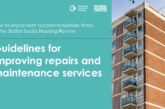A major new research project has been launched that will examine the impact of the Covid pandemic and the ‘new normal’ on low-paid remote workers in the UK.
The research is being funded by leading housing provider Stonewater and will be carried out by Demos, Britain’s leading cross-party think-tank.
The report aims to understand the impacts of remote working on low-paid workers in the UK, and highlight any barriers faced by low-paid workers from being able to safely and efficiently work from home.
The impact of the pandemic has been felt across the world but, in the UK, low-paid workers have been particularly hit the hardest.
Stonewater recently announced that it would not be reverting back to a ‘traditional desk model’ and instead would be adopting a hybrid working model, with colleagues continuing to primarily work from home with future workspaces shaped around providing opportunities for collaborative, creative and lone working.
To support this, all permanent employees are being offered an interest free loan of up to £10,000 to create a safe and healthy designated workspace in their home environment. However, aware that many of its own customers will not be offered the same, Stonewater has commissioned the report by Demos to understand how the housing sector, Government and society as a whole can better support low-paid workers to adapt to post-pandemic working patterns.
Demos’ work will focus particularly on those who earn less than £20,000, and potential new poverties that will be created as a result of a shift to working from home, including digital poverty, connectivity poverty, and space poverty.
The report is set to launch in November 2021.
Nicholas Harris, Chief Executive Officer of Stonewater, said: “Stonewater is in a unique position to examine the impact of the new normal on our customers and colleagues up and down the country. As a leading provider of social housing, we are able to speak directly to customers who may have been affected by the shift in working patterns and who have had to find suitable space to work from home.
“We recognise that the shift to homeworking has been difficult for many workers, particularly low-paid employees who might lack the provision and space to work from home, and for whom this shift will have been particularly difficult. However, we also want to make sure that low paid workers are able to take advantage of how new ways of working makes work less reliant on where you live.
“We are supporting our own colleagues with adapting to working from home more often, but know that not every employee has the same benefits. We are therefore delighted to be working with Demos to ensure that those on the lowest incomes are not forgotten and that they can be supported in the new normal.”
Rose Lasko-Skinner, Senior Researcher at Demos commented: “The COVID-19 pandemic has transformed the way that many of us work. Much of the focus has been on better paid home workers, overlooking the experiences of low-paid remote workers who may continue to work from home for the long-term.
“There are plenty of benefits to remote working, but there are likely downsides too and it is likely that these are felt most acutely by low paid workers. It’s vital that we better understand their experiences of remote working so that we are able to maximise its value to low-paid workers.
“This report will provide solutions to this challenge. We’re delighted to be supported by Stonewater to develop these recommendations which will make a real difference to thousands of low-paid workers.”









